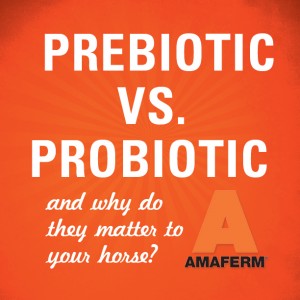 Researchers and veterinarians believe a healthy gut reduces gas and/or colic, improves digestion and absorption of nutrients, benefits the immune system, protects the horse against infection (e.g., by diarrhea-causing organisms such as Salmonella or Clostridium), and minimizes the occurrence of laminitis.
Researchers and veterinarians believe a healthy gut reduces gas and/or colic, improves digestion and absorption of nutrients, benefits the immune system, protects the horse against infection (e.g., by diarrhea-causing organisms such as Salmonella or Clostridium), and minimizes the occurrence of laminitis.
Something occurs almost daily that can shift the microbial population in the gut of a horse causing it to become unhealthy, thereby increasing the number of “bad” microbes and reducing the number of “good” ones. The vet comes to vaccinate, the farrier digs out an abscess, a new load of hay arrives, the weather changes, a horse gets the wrong feed or has to travel to a show—all these events can cause digestive stress and disrupt the microbes in the hindgut. Adding or impacting the “good” microbes daily through supplementation minimizes the odds of the “bad” ones having much effect.
Despite the similarity in their names, prebiotics and probiotics are not two different forms of a similar supplement. They are actually two completely different types of supplements. To be considered a probiotic, the bacteria included in the supplement must be alive when administered. This life adds “good” microbes and bacteria to the animal. One caution with a probiotic, is that this “life” can become death with the heat, the cold or other environmental challenges for the product; therefore, causing the probiotic to not be as effective if at all.
Prebiotics, on the other hand, are not alive but rather work to enhance the naturally occurring growth and benefits of the good microbes. Prebiotics are multipliers of good microbes, where as probiotics add microbes. It does no good to feed probiotics unless they are nourished and placed in an environment where they can flourish.
Both prebiotics and probiotics are commonly used in high performance horse diets as they can help make a difference in keeping the horse functioning at its best. Young and aged horses also benefit from probiotic and prebiotic use, as their intestinal tracts usually are not functioning at peak efficiency. Foals for instance, lack a fully balanced level of bacteria in their systems and thus cannot completely and effectively digest food. Aged horses on the other hand often have intestinal scarring or other conditions that make it difficult for them to digest and absorb their food.
AMAFERM® can help in all of these instances. AMAFERM is a prebiotic that was created using a select strain of Aspergillus oryzae from a proprietary process yielding a product that is solely engineered and manufactured for animal diets. AMAFERM has been extensively researched by universities and private facilities worldwide with more than 100 peer reviewed published papers that prove its impact on the microbes and the animal in which those microbes reside. The good news is that AMAFERM is in all of our products. So whether you are looking for a gel, top-dress or loose mineral your horse will be able to benefit from our prebiotic.

